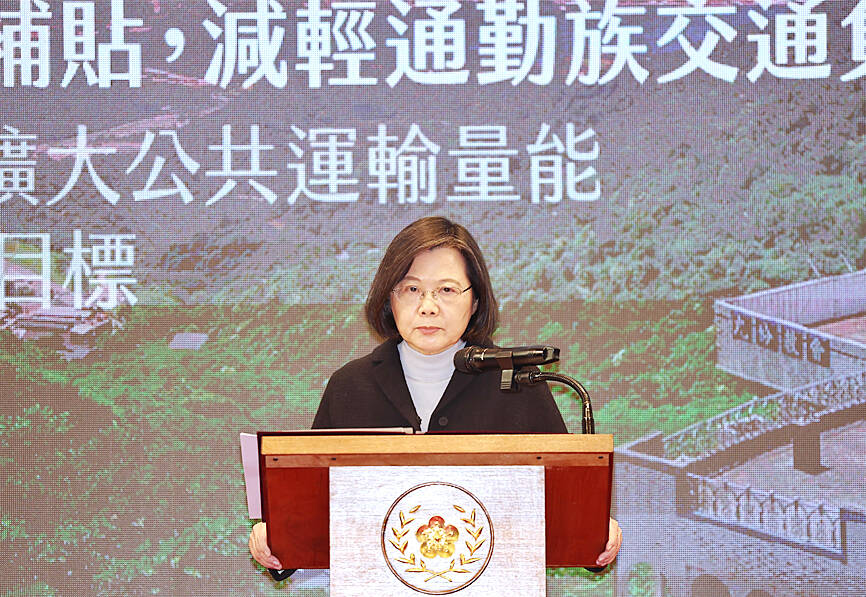President Tsai Ing-wen (蔡英文) in her New Year’s address yesterday urged Beijing to resume talks with Taipei to help maintain stability in the region.
“War is never an option for solving a problem,” Tsai said. “Only by boosting stable development in the region together through dialogue and collaboration can we bring security and happiness to more people.”
“It is the common responsibilities of the two sides across the Taiwan Strait to maintain stability in the region,” she said, adding she is looking forward to the resumption of regular exchanges between the two sides of the Taiwan Strait when the COVID-19 pandemic subsides

Photo: CNA
Chinese President Xi Jinping (習近平) made only a brief reference to Taiwan in his New Year’s address on Saturday evening, saying that people on both sides of the Strait “are members of one and the same family.”
Some local media have speculated that Xi was using a softer tone concerning cross-strait relations as he did not specifically call for cross-strait unification in his Saturday address, although he did imply it.
Tsai, in response to media questions about Xi’s address, said Xi was using a more “gentle tone” in reference to cross-strait relations.
“But I want to remind people — the military activities of the People’s Liberation Army near Taiwan are not at all conducive to cross-strait relations nor regional peace and stability,” she said.
The Ministry of National Defense said that 24 Chinese People’s Liberation Army aircraft and four navy vessels were seen near Taiwan from 6am on Saturday to 6am yesterday, with 15 of the aircraft crossing the median line of the Taiwan Strait — a slightly higher number than the average daily figure.
Beijing has been aggressively ramping up pressure on Taiwan with military exercises over the past few months since US House of Representatives Speaker Nancy Pelosi visited Taipei in August, leading to growing concern among stakeholders in the region, including Washington.
In her New Year’s address, Tsai also said that Taiwan is willing to provide China with “necessary assistance” to help it deal with a surge in COVID-19 cases, so that more Chinese people can enjoy a healthy and safe year.
In an abrupt change of policy, China last month began dismantling the world’s strictest COVID-19 regime of lockdowns and extensive testing, meaning the disease is spreading largely unchecked and likely infecting millions of people per day, some international health experts say.
“As long as there is a need, based on the position of humanitarian care, we are willing to provide the necessary assistance to help more people emerge from the pandemic and have a healthy and safe new year,” Tsai said, without elaborating.
Tsai did not say if China had made such a request.

INVESTIGATION: The case is the latest instance of a DPP figure being implicated in an espionage network accused of allegedly leaking information to Chinese intelligence Democratic Progressive Party (DPP) member Ho Jen-chieh (何仁傑) was detained and held incommunicado yesterday on suspicion of spying for China during his tenure as assistant to then-minister of foreign affairs Joseph Wu (吳釗燮). The Taipei District Prosecutors’ Office said Ho was implicated during its investigation into alleged spying activities by former Presidential Office consultant Wu Shang-yu (吳尚雨). Prosecutors said there is reason to believe Ho breached the National Security Act (國家安全法) by leaking classified Ministry of Foreign Affairs information to Chinese intelligence. Following interrogation, prosecutors petitioned the Taipei District Court to detain Ho, citing concerns over potential collusion or tampering of evidence. The

Seventy percent of middle and elementary schools now conduct English classes entirely in English, the Ministry of Education said, as it encourages schools nationwide to adopt this practice Minister of Education (MOE) Cheng Ying-yao (鄭英耀) is scheduled to present a report on the government’s bilingual education policy to the Legislative Yuan’s Education and Culture Committee today. The report would outline strategies aimed at expanding access to education, reducing regional disparities and improving talent cultivation. Implementation of bilingual education policies has varied across local governments, occasionally drawing public criticism. For example, some schools have required teachers of non-English subjects to pass English proficiency

‘FORM OF PROTEST’: The German Institute Taipei said it was ‘shocked’ to see Nazi symbolism used in connection with political aims as it condemned the incident Sung Chien-liang (宋建樑), who led efforts to recall Democratic Progressive Party (DPP) Legislator Lee Kun-cheng (李坤城), was released on bail of NT$80,000 yesterday amid an outcry over a Nazi armband he wore to questioning the night before. Sung arrived at the New Taipei City District Prosecutors’ Office for questioning in a recall petition forgery case on Tuesday night wearing a red armband bearing a swastika, carrying a copy of Adolf Hitler’s Mein Kampf and giving a Nazi salute. Sung left the building at 1:15am without the armband and apparently covering the book with a coat. This is a serious international scandal and Chinese

NEGOTIATIONS: The US response to the countermeasures and plans Taiwan presented has been positive, including boosting procurement and investment, the president said Taiwan is included in the first group for trade negotiations with the US, President William Lai (賴清德) said yesterday, as he seeks to shield Taiwanese exporters from a 32 percent tariff. In Washington, US Trade Representative Jamieson Greer said in an interview on Fox News on Thursday that he would speak to his Taiwanese and Israeli counterparts yesterday about tariffs after holding a long discussion with the Vietnamese earlier. US President Donald Trump on Wednesday postponed punishing levies on multiple trade partners, including Taiwan, for three months after trillions of US dollars were wiped off global markets. He has maintained a 10 percent